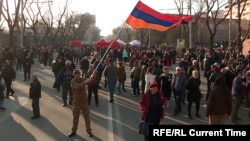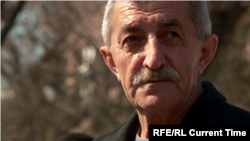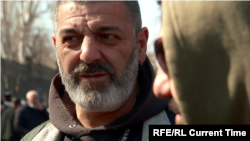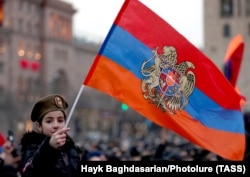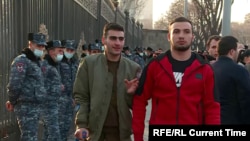When word came of Armenia’s November 9, 2020 ceasefire agreement with Azerbaijan, Armenian Army Colonel Artashe Mkhitarian remembers wanting to cry on the frontline “from the shame and disgrace” of his country’s territorial handovers. Now, this senior officer is on another frontline – this time, a political one, as a participant in round-the-clock demonstrations in Yerevan for Armenian Prime Minister Nikol Pashinian’s resignation.
Four months after Azerbaijan regained control over large parts of the disputed Nagorno-Karabakh region and all of seven surrounding territories, whether or not Pashinian will remain in office has become Armenia’s ultimate post-war quandary. With ordinary Armenians, politicians, officials, and, apparently, the military divided over how to answer that question, no prompt resolution to the political crisis is in sight.
The “situation at the given moment is at a bit of a dead end,” conceded Deputy Parliamentary Speaker Alen Simonian, a member of Pashinian’s parliamentary My Step faction, on March 1.
Though out of the public eye, Armenian opposition members and the government are staging “intensive negotiations” and meeting constantly, but the participants, said political scientist Alexander Iskandaryan, director of Yerevan’s Caucasus House think-tank, are “heterogenous” and disunified.
On March 1, Pashinian re-proposed early parliamentary elections as a potential solution to Armenia’s political impasse if his own faction and parliament’s two opposition parties, Prosperous Armenia and Bright Armenia, can agree on the details. The vote is currently scheduled to take place in 2023.
But, here, too, there is no accord.
The populist Prosperous Armenia, which holds 24 seats in Armenia’s 132-seat National Assembly, has not yet decided on the proposal, but in March 1 remarks to Current Time, the faction’s secretary, Arman Abovian, asserted that the only possible “compromise” with the government is Pashinian’s resignation.
The Homeland Salvation Movement, a sprawling political alliance of which Prosperous Armenia is part, earlier called for a boycott of any early parliamentary elections. The Movement’s leader, 75-year-old Vazgen Manukian, post-Soviet Armenia’s first prime minister, currently faces prosecution for allegedly inciting violence against the government -- a charge he rejects as politically motivated.
The head of Bright Armenia’s 17-member faction, Edmon Manukian, does not back the Movement’s demands for Pashinian’s resignation, but told journalists after a March 5 meeting with the prime minister that he did not yet know how to find “a way out” of the political crisis, Radio Free Europe/Radio Liberty’s Armenian Service reported.
Ultimately, however, the prime minister agreeing to elections ahead of the scheduled 2023 ballot is more of a tactical decision and its status could evolve, stressed Hrant Mikaelian, a political scientist at Yerevan’s Caucasus Institute.
“If he’s forced to hold elections, he will hold them, but if he manages to avoid holding elections, then he’ll try to do everything in order to minimize the risk of losing power,” Mikaelian said.
Roughly a month ago, the prime minister had rejected the idea of snap elections (after proposing them earlier), claiming that public interest was insufficient. What happened in the weeks since was a February 25 demand from 40 senior military officers for Pashinian’s resignation that the prime minister labeled a coup attempt.
To support that demand, protesters sympathetic to these officers have built a tent city on downtown Yerevan’s Baghramian Avenue, near parliament. They claim they will stay put until the prime minister leaves office for betraying Armenia’s national interests with the ceasefire agreement.
“We didn’t lose [the war with Azerbaijan]. He lost, betraying his own people,” protester Armen Petrosian, a combatant who lost two brothers in the 44 days of fighting, said of Pashinian. “My army didn’t lose. My army fought beyond what was possible.”
But Pashinian, who came into power in 2018 on the strength of street protests over Armenia’s 2017 parliamentary elections, can stage rallies, too. Although some critics contend that the government has bussed in participants or compelled them to attend, more sympathetic observers believe that the large-scale turnout at the prime minister’s rival rallies in Yerevan shows that his voter support still surpasses that of the opposition.
Nonetheless, Pashinian appears to be reinforcing his political defenses. He already has asked parliament’s three factions to agree that they will not elect another prime minister before any early election if he resigns to take part in the vote.
Yet, simultaneously, he has proposed scrapping Armenia’s parliamentary system of government and returning to a semi-presidential system, a more top-down structure that ended with the 2017 parliamentary elections.
That does not mean, however, that the prime minister wishes to strengthen the role of the current president, Armen Sarkisian. Indeed, Sarkisian’s refusal to sign Pashinian’s order firing army chief of staff General Onik Gasparian after the demand for the prime minister’s resignation may mean that the president now could face impeachment by parliament, political scientist Stepan Grigorian predicted.
Pashinian’s My Step faction is just several seats short of the two-thirds majority needed to remove the president from office, noted Grigorian.
Whether any such move would resonate with Armenian voters is unknown. Political scientist Mikaelian cautioned that both opposition and government are now “very weak and unpopular.”
For two soldiers who stumbled across the anti-Pashinian demonstrators on Baghramian Avenue, that particularly appears to be true for the opposition. Despite demonstrators' professed support for the military, the young men said they cannot identify with their cause.
“I don’t have anything at all to do with all this,” said 19-year-old private Aik Makhitrian, still recovering from a leg injury he received during the 2020 war. “This is a fight for power.”
“If this [ceasefire] agreement hadn’t been signed, then we wouldn’t even have what we have now. All of our army would have died there [in the conflict zone],” Makhitrian continued.
His friend, a war veteran who gave his name as Georg, agreed.
“I don’t like it that our country capitulated, but I’m glad that we’re alive,” Georg said. “This is the most important thing.”




